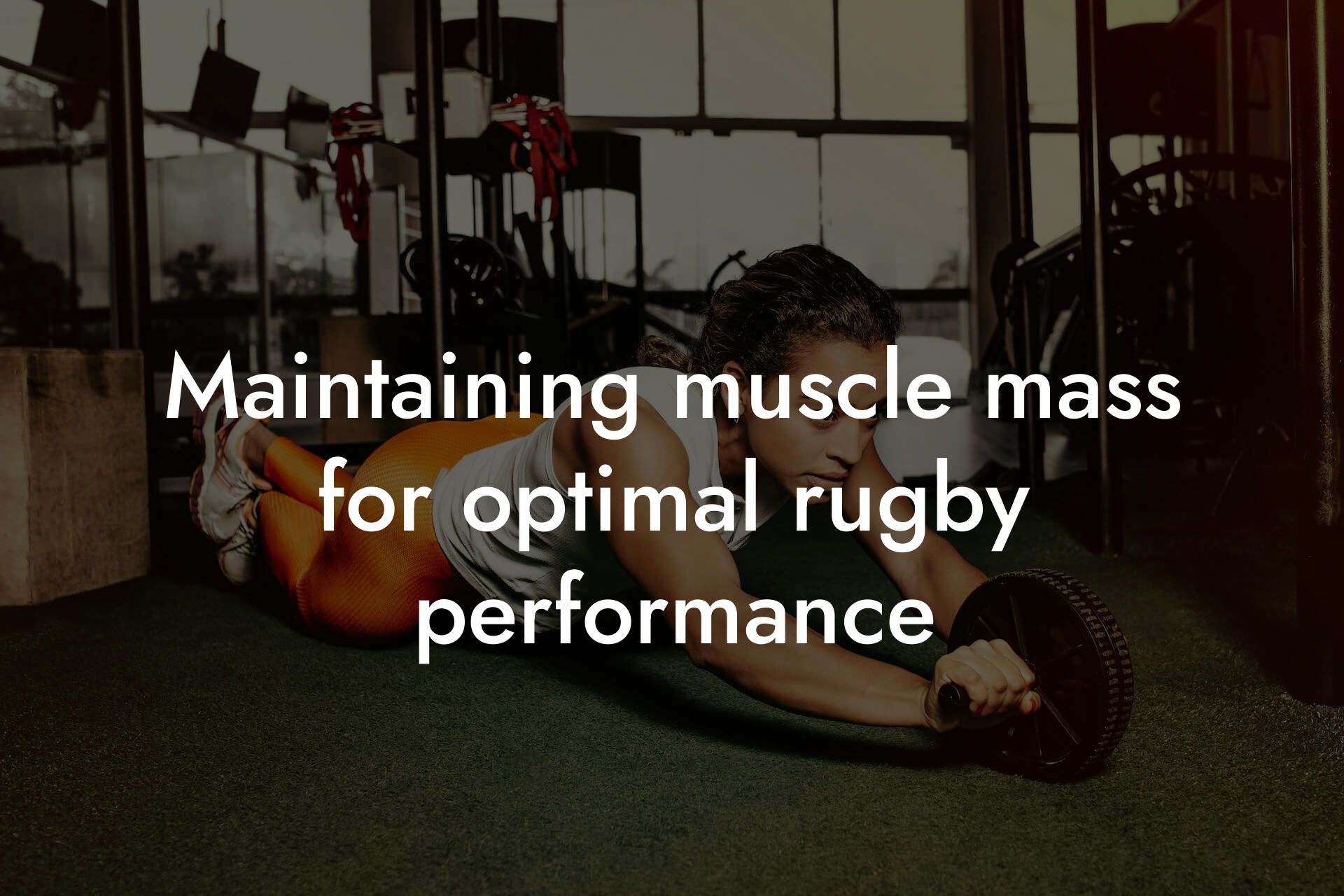Rugby is a physically demanding sport that requires a unique combination of strength, power, speed, and endurance. A player's body composition plays a critical role in their overall performance, as it can affect their ability to execute skills, withstand physical contact, and maintain a high intensity over the course of a match. In this article, we'll delve into the importance of body composition in rugby, how it impacts performance, and what players can do to optimize their body composition for success on the pitch.
Table of Contents
What is Body Composition?
Body composition refers to the proportion of fat and lean mass in the body. Lean mass includes muscle, bone, and other non-fat tissues, while fat mass includes both essential and storage fat. In the context of rugby, body composition is critical because it affects a player's power-to-weight ratio, speed, agility, and endurance. A player with a high percentage of lean mass and a low percentage of body fat will generally be faster, stronger, and more agile than a player with a higher percentage of body fat.
The Ideal Body Composition for Rugby Players
The ideal body composition for rugby players varies depending on the position played. Generally, forwards tend to have a higher percentage of body fat than backs, as they require more strength and power to engage in physical contact and win collisions. Backs, on the other hand, require more speed and agility, and therefore tend to have a lower percentage of body fat. Here are some general guidelines for body composition in rugby players:
Forwards: 15-20% body fat, 40-50% lean mass
Backs: 10-15% body fat, 45-55% lean mass
How Body Composition Affects Rugby Performance
A player's body composition can affect their rugby performance in several ways:
Power and Speed: A player with a high percentage of lean mass will be able to generate more power and speed, as they have more muscle mass to propel them forward.
Endurance: A player with a high percentage of lean mass will also have a greater aerobic capacity, allowing them to maintain a high intensity over the course of a match.
Agility and Quickness: A player with a low percentage of body fat will be able to change direction quickly and accelerate rapidly, making them more effective in open play.
Injury Risk: A player with a high percentage of body fat may be more susceptible to injury, as excess fat can put additional stress on joints and muscles.
Measuring Body Composition in Rugby Players
There are several methods for measuring body composition in rugby players, including:
Dual-Energy X-ray Absorptiometry (DEXA): This is a non-invasive, highly accurate method that uses X-rays to measure bone density and body composition.
Hydrostatic Weighing: This method involves weighing a player underwater to determine their body density, which can then be used to estimate body composition.
Skinfold Measurements: This method involves measuring the thickness of skin folds at specific points on the body to estimate body fat percentage.
Optimizing Body Composition for Rugby Performance
Rugby players can optimize their body composition through a combination of proper nutrition, training, and recovery. Here are some tips:
Resistance Training: Incorporate resistance exercises into your training program to build lean mass and increase strength.
High-Intensity Interval Training: Incorporate high-intensity interval training into your conditioning program to improve speed, agility, and endurance.
Proper Nutrition: Focus on consuming a balanced diet that includes plenty of protein, complex carbohydrates, and healthy fats to support muscle growth and recovery.
Recovery: Prioritize recovery techniques such as stretching, foam rolling, and self-myofascial release to help your body adapt to the demands of rugby.
In conclusion, body composition plays a critical role in rugby performance. By understanding the importance of body composition and how it affects performance, rugby players can take steps to optimize their body composition and gain a competitive edge on the pitch. At Tano Performance Group, we use advanced technology such as DEXA scanning to provide rugby players with a complete body assessment and personalized guidance on how to optimize their body composition for success.
Take Your Rugby Performance to the Next Level
If you're a rugby player looking to take your performance to the next level, contact Tano Performance Group today to learn more about our body composition assessment and training programs. With our expert guidance and cutting-edge technology, you can optimize your body composition and achieve your goals on the pitch.
Frequently Asked Questions
What is body composition, and why is it important in rugby?
Body composition refers to the percentage of fat and lean mass in the body. In rugby, body composition is crucial as it affects performance, speed, agility, and overall athletic ability. A high percentage of lean mass can improve power, strength, and endurance, while excess body fat can hinder performance and increase the risk of injury.
How does body composition affect rugby performance?
Body composition has a significant impact on rugby performance. A player with a high percentage of lean mass can generate more power, speed, and endurance, making them more effective on the field. On the other hand, excess body fat can slow down a player, making them less agile and more prone to fatigue.
What is the ideal body composition for a rugby player?
The ideal body composition for a rugby player varies depending on the position and individual goals. However, a general guideline is to aim for a body fat percentage between 10-15% for backs and 15-20% for forwards. This allows for a balance between lean mass and body fat, ensuring optimal performance and reducing the risk of injury.
How can I measure my body composition?
There are several ways to measure body composition, including dual-energy X-ray absorptiometry (DXA), skinfold measurements, bioelectrical impedance analysis (BIA), and hydrostatic weighing. Each method has its own advantages and limitations, and it's essential to consult with a qualified professional to determine the best method for you.
What is the difference between lean mass and body fat?
Lean mass refers to the amount of muscle, bone, and other non-fat tissues in the body. Body fat, on the other hand, is the amount of adipose tissue in the body. A high percentage of lean mass is desirable for rugby players, as it indicates a high level of muscle mass and athletic ability.
How can I increase my lean mass?
Increase your lean mass by focusing on a balanced diet that includes plenty of protein, carbohydrates, and healthy fats. Resistance training exercises, such as weightlifting and bodyweight exercises, can also help build muscle mass. Additionally, adequate rest and recovery are crucial for muscle growth and repair.
How can I reduce my body fat percentage?
Reduce your body fat percentage by creating a calorie deficit through a combination of diet and exercise. Focus on eating a balanced diet that is high in protein and low in processed foods and added sugars. Incorporate high-intensity interval training (HIIT) and resistance training exercises to help burn fat and build lean mass.
What is the relationship between body composition and injury risk?
Excess body fat can increase the risk of injury in rugby players. This is because excess fat can put additional stress on joints and muscles, making them more prone to strain and injury. Maintaining a healthy body composition can reduce the risk of injury and improve overall athletic performance.
How can I maintain a healthy body composition during the rugby season?
Maintain a healthy body composition during the rugby season by focusing on a balanced diet and regular exercise. Make sure to listen to your body and take rest days as needed, as overtraining can lead to fatigue and decreased performance.
What role does nutrition play in body composition?
Nutrition plays a critical role in body composition. A balanced diet that is high in protein, complex carbohydrates, and healthy fats can help support muscle growth and repair. A diet that is high in processed foods and added sugars can lead to an increase in body fat and a decrease in lean mass.
How can I use nutrition to support my rugby performance?
Support your rugby performance by fueling your body with a balanced diet that includes plenty of protein, complex carbohydrates, and healthy fats. Aim to eat a meal or snack that includes a source of protein and complex carbohydrates within 30-60 minutes after exercise to aid in recovery.
What are the benefits of tracking my body composition?
Tracking your body composition can help you monitor your progress, identify areas for improvement, and make data-driven decisions about your training and nutrition. This can lead to improved performance, increased confidence, and a reduced risk of injury.
How often should I track my body composition?
The frequency of tracking body composition depends on individual goals and needs. For rugby players, it's recommended to track body composition every 4-6 weeks to monitor progress and make adjustments to training and nutrition as needed.
What is the relationship between body composition and bone density?
Body composition and bone density are closely linked. A high percentage of lean mass can help support bone density, reducing the risk of osteoporosis and fractures. Conversely, a high percentage of body fat can lead to a decrease in bone density, increasing the risk of injury.
How can I improve my bone density?
Improve your bone density by engaging in weight-bearing exercises, such as weightlifting and jumping exercises. A diet rich in calcium and vitamin D can also support bone health. Additionally, maintaining a healthy body composition can help support bone density.
What is the impact of body composition on mental performance?
Body composition can have a significant impact on mental performance. A healthy body composition can improve confidence, reduce anxiety and depression, and enhance overall mental well-being. Conversely, a poor body composition can lead to decreased confidence and increased stress.
How can I use body composition to improve my mental performance?
Improve your mental performance by focusing on a healthy body composition. Engage in regular exercise and eat a balanced diet to support mental well-being. Additionally, tracking your body composition can help you feel more in control and confident, leading to improved mental performance.
What are the benefits of working with a qualified professional to track my body composition?
Working with a qualified professional can provide personalized guidance and support, helping you achieve your body composition goals. A professional can also help you develop a customized training and nutrition plan, ensuring you're making progress towards your goals.
How can I use body composition to improve my overall health and well-being?
Improve your overall health and well-being by focusing on a healthy body composition. This can reduce the risk of chronic diseases, such as heart disease and diabetes, and improve overall physical and mental health.
What are the common mistakes rugby players make when it comes to body composition?
Common mistakes rugby players make when it comes to body composition include neglecting nutrition, overtraining, and failing to track progress. These mistakes can lead to decreased performance, increased risk of injury, and poor overall health.
How can I avoid common mistakes and achieve my body composition goals?
Avoid common mistakes by focusing on a balanced diet, regular exercise, and tracking your progress. Work with a qualified professional to develop a customized training and nutrition plan, and stay committed to your goals.
What is the role of genetics in body composition?
Genetics play a role in body composition, as they can influence factors such as metabolism and body shape. However, genetics are not the sole determining factor, and individual choices regarding diet and exercise can still have a significant impact on body composition.
How can I overcome genetic limitations and achieve my body composition goals?
Overcome genetic limitations by focusing on a healthy diet and regular exercise. Work with a qualified professional to develop a customized training and nutrition plan, and stay committed to your goals. Additionally, celebrate small victories and focus on progress, rather than perfection.
Here are some related articles you might love...
- Strength training programs for amateur rugby players
- Using DEXA scans to optimize rugby training
- Maintaining muscle mass for optimal rugby performance
- Nutrition strategies for sustaining energy during rugby matches
- How to optimize endurance and power in rugby
- Recovery strategies for rugby athletes after matches
- Reducing body fat for better agility and power in rugby
- Off-season conditioning for amateur rugby players
- Bone density and injury prevention in rugby
Zak Faulkner
Zak Faulkner is a leading authority in the realm of physical health and body composition analysis, with over 15 years of experience helping professionals optimise their fitness and well-being. As one the experts behind Tano Performance Group, Zak has dedicated his career to providing in-depth, science-backed insights that empower clients to elevate their physical performance and overall health.
With extensive knowledge of DEXA technology, Zak specializes in delivering comprehensive body assessments that offer precise data on body fat, muscle mass, bone density, and overall physique. His expertise enables individuals to make informed decisions and achieve their fitness goals with accuracy and confidence. Zak’s approach is rooted in a deep understanding of human physiology, combined with a passion for helping clients unlock their full potential through personalised strategies.
Over the years, Zak has earned a reputation for his commitment to excellence, precision, and client-focused service. His guidance is trusted by top professionals who demand the best when it comes to their health. Whether advising on fitness programs, nutritional strategies, or long-term wellness plans, Zak Faulkner’s insights are a valuable resource for anyone serious about taking their health and fitness to the next level.
At Tano Performance Group, Zak continues to lead our Content Team revolutionising how professionals approach their physical health, offering unparalleled expertise that drives real results.




